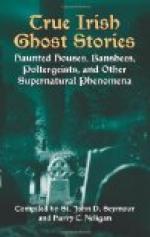We may now anticipate one or two possible points of criticism. It might be alleged that the publication of such a book as this would tend to show that the Irish nation was enslaved in superstition. Without stopping to review the question as to what should, or should not, be classed as “superstition,” we would rejoin by gleefully pointing to a leading article in the Irish Times of Jan. 27, 1914, which gives a short account of a lecture by Mr. Lovett on the folklore of London. Folklore in London! in the metropolis of the stolid Englishman! The fact is that the Irish people are not one whit more superstitious than their cross-channel neighbours, while they are surely on a far higher level in this respect than many of the Continental nations. They seem to be more superstitious because (we speak without wishing to give any offence) the popular religion of the majority has incorporated certain elements which may be traced back to pre-Christian times; but that they are actually more superstitious we beg leave to doubt.
Another and more important series of objections is stated by one of our correspondents as follows. “I must confess that I can never reconcile with my conception of an All-Wise Creator the type of ‘ghost’ you are at present interested in; it seems to me incredible that the spirits of the departed should be permitted to return and indulge in the ghostly repertoire of jangling chains, gurgling, etc., apparently for the sole purpose of scaring housemaids and other timid or hysterical people.” The first and most obvious remark on this is, that our correspondent has never read or heard a ghost story, save of the Christmas magazine type, else he would be aware that the above theatrical display is not an integral part of the “ghostly repertoire”; and also that persons, who are not housemaids, and who can not be classed as timid or hysterical, but who, on the other hand, are exceedingly sober-minded, courageous, and level-headed, have had experiences (and been frightened by them too!) which cannot be explained on ordinary grounds. But on the main point our correspondent is begging the question, or at least assuming as fully proved a conclusion which is very far from being so. Is he quite sure that the only explanation of these strange sights and weird noises is that they are brought about by the action of departed spirits (we naturally exclude cases of deliberate fraud, which in reality are very unusual)? And if so, what meaning would he put upon the word “spirits”? And even if it be granted that the phenomena are caused by the inhabitants of another world, why should it be impossible to accept such a theory, because of its apparent incompatibility with any conception of an All-Wise Creator, of whose workings we are so profoundly ignorant? Are there not many things in the material world which to the limited human mind of our correspondent must seem puzzling, meaningless, useless, and even harmful?




